Posts in Category: News
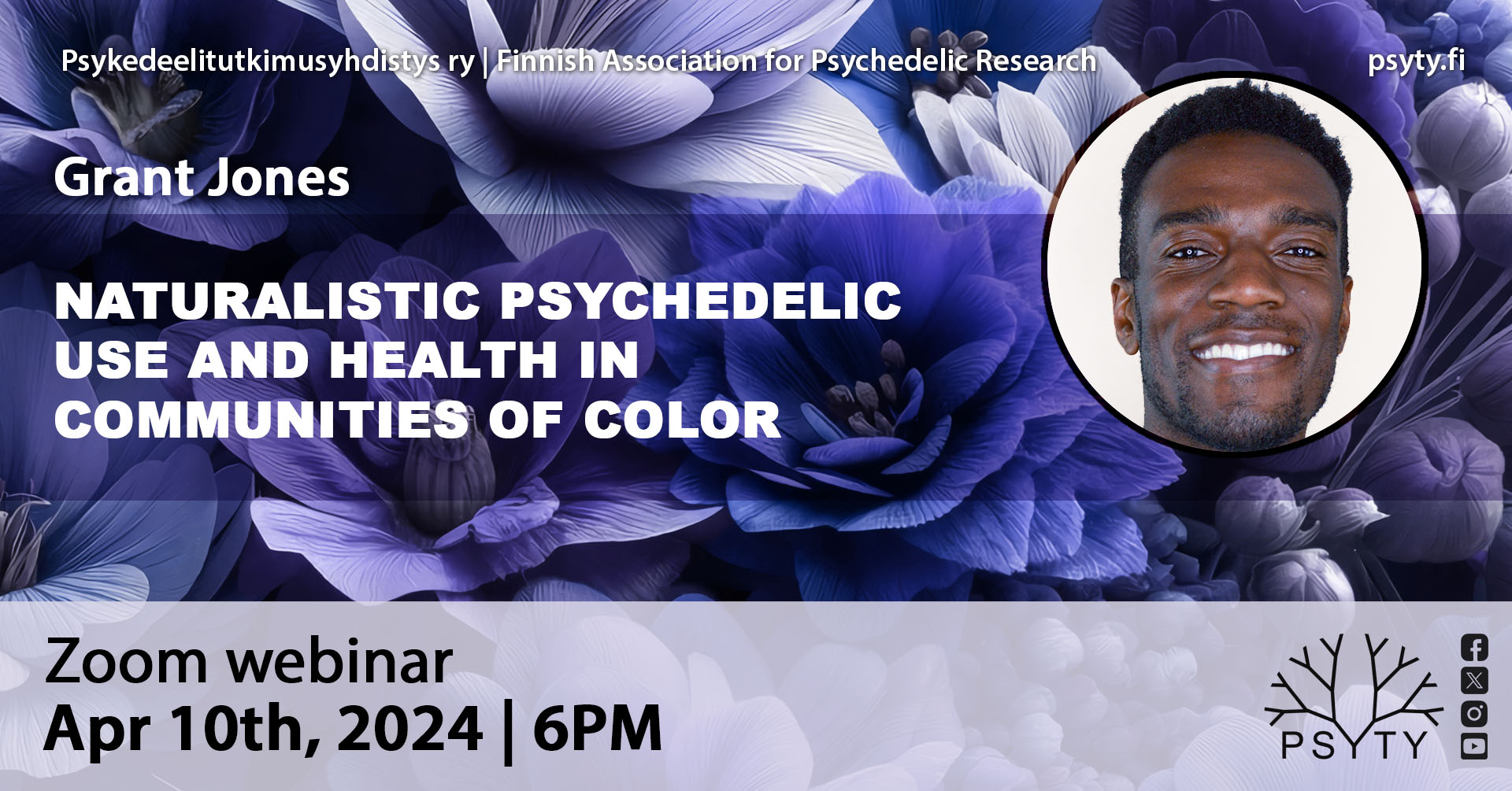
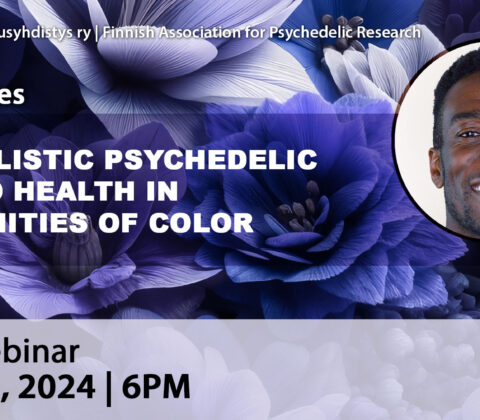
Webinar April 10th, 2024: Grant Jones – Naturalistic psychedelic use and health in communities of color
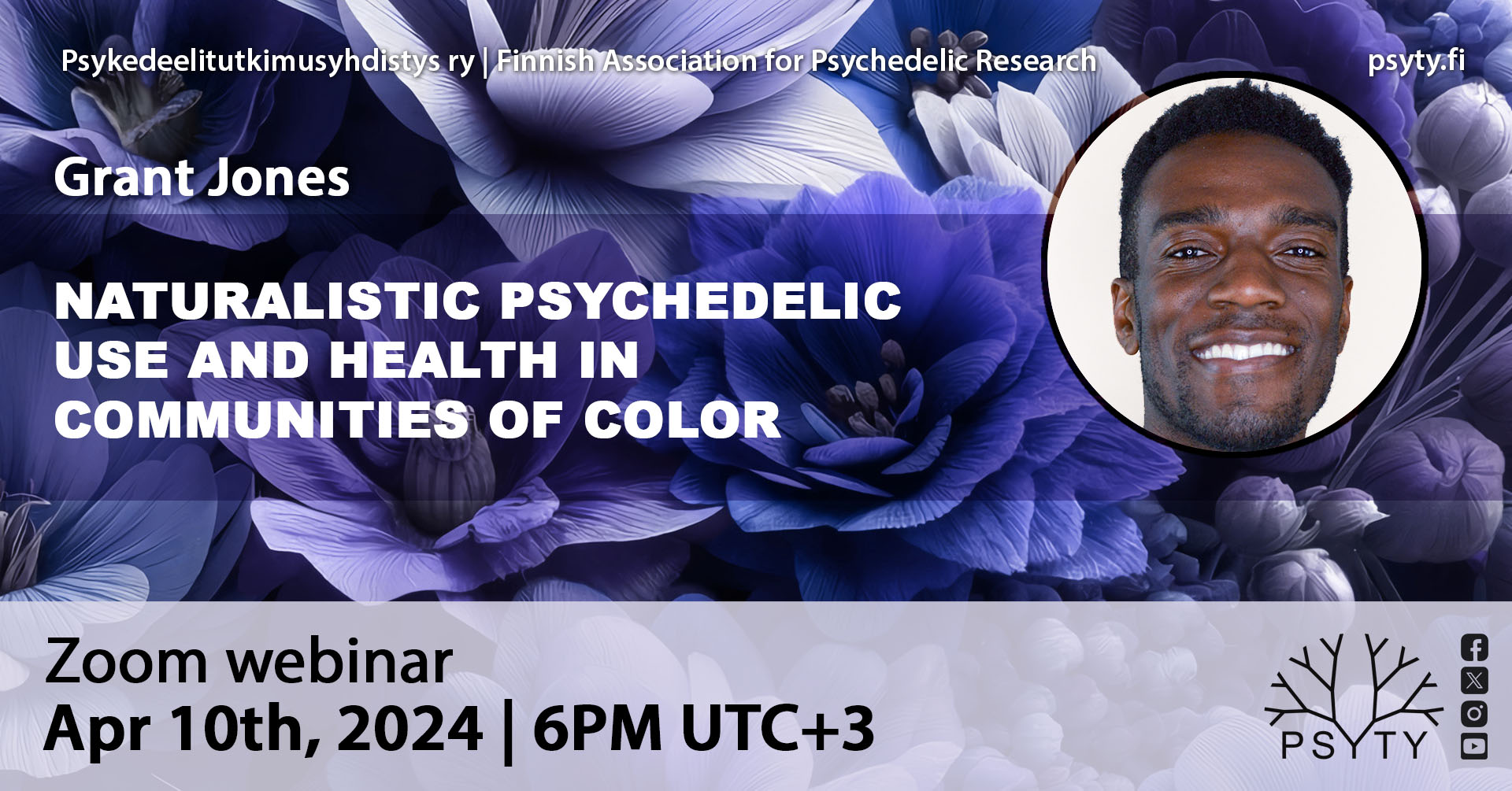
Psychedelics are gaining increased attention in both clinical research and popular culture as they represent novel treatments for a host of difficult-to-treat mental health conditions (e.g., PTSD, depression). Much of this interest has been driven by a number of groundbreaking clinical trials that have demonstrated the possible therapeutic efficacy of these substances in carefully controlled treatment settings. However, these trials have two key limitations. First, they have limited ecological validity (i.e., these findings might not generalize to real-world settings). Second, they feature a severe dearth of participants of color.
Psychology researcher Grant Jones is presenting in a webinar by the Finnish Association for Psychedelic Research on April 10th, 6PM UTC+3. The talk addresses his research that aims to address the limitations of existing research, providing an overview of his research findings in the field of naturalistic (i.e., non-clinical, real world) psychedelic use and health in communities of color. Additionally, this talk addresses the key next steps inspired by this existing research.
Deviating from our typical webinars, the length of the event is one hour, and the lecture segment will be shorter than normal. Following Jones’s introduction, our host, psychology professor Markus Jokela, will present his initial reflections on the presented research, which will then be followed by an audience discussion segment.
Tickets are available from our web store. The event is free for charge for members who’ve paid their membership fee for 2024. If you want to pay your membership fee for this year or become a member, you’ll find our membership products on the main page of our web store. If you’ve already paid your membership fee, you’ll find your free registration link in the email about this event or the web store receipt.
About the speaker:
Grant Jones is a contemplative, musician, and a researcher writing his PhD thesis in the Clinical Psychology PhD program at Harvard University. His research is focused on better understanding how altered states of consciousness play a role in the flourishing of underserved communities. Currently, his research focuses on three core areas – meditation, music, and substance use – and investigating the relationships that these domains share with the well-being of individuals with diverse identities. His substance use research has particularly focused on psychedelic substances like psilocybin (the active compound in “magic mushrooms”) and understanding whether naturalistic (i.e., non-clinical) use of these substances is associated with lowered odds of adverse mental health and behavioral outcomes.
His research uses a number of approaches to study altered states, including epidemiological survey studies and intervention trials. His research has been funded by grants from the Harvard Culture Lab Innovation Fund, the Source Research Foundation, the Harvard Psychology Department, the Mind & Life Institute, and the National Academies of Sciences, Engineering, and Medicine. Additionally, his research has been recognized through awards from the Ford Foundation, the Society for Research in Psychopathology, the Association for Psychological Science, and the Association for Behavioral and Cognitive Therapies Addictive Behaviors Special Interest Group (SIG).
About the host:
Markus Jokela is a professor of mental health research at the University of Helsinki. His educational background is in psychology, sociology, and public health. In his research, Jokela has explored how individual psychological differences are associated with social behaviors that influence population dynamics, e.g., health inequalities, selective residential mobility, and family formation. This research is based on longitudinal studies collected in many different countries. Jokela wants to promote a broader understanding of mental health that considers not only the diagnostic approach but also wider themes of humanity, such as humanistic, existential, and spiritual perspectives. In 2024, he also serves as a board member of the Finnish Association for Psychedelic Research.
Finnish thesis competition 2022–2023
The Finnish Association for Psychedelic Research is once again organizing a competition for the best psychedelic-themed thesis. The competition is held biennially, this year marking its fourth occurrence. This round includes works completed in 2022 and 2023.
If you’ve written an academic thesis (bachelor’s thesis, master’s thesis, licentiate thesis, diploma thesis, or a comparable university of applied sciences thesis) that was approved in a Finnish higher education institution (or if you’re a Finn and did your thesis abroad) in 2022 or 2023, and deals with psychedelics, you can participate in the competition by sending your work to psyty@psyty.fi by February 28, 2024. The competition is open to works from all disciplines.
A multidisciplinary jury, consisting of members of the association’s board, will evaluate the theses and select the winner by the association’s spring meeting in 2024. The winning thesis will be presented on Psyty’s website and social media channels, and the author will be awarded a 200 euro scholarship.
A freely distributable link to the competition and information about our previous thesis competitions can be found here (in Finnish, but you can use automatic translation tools).
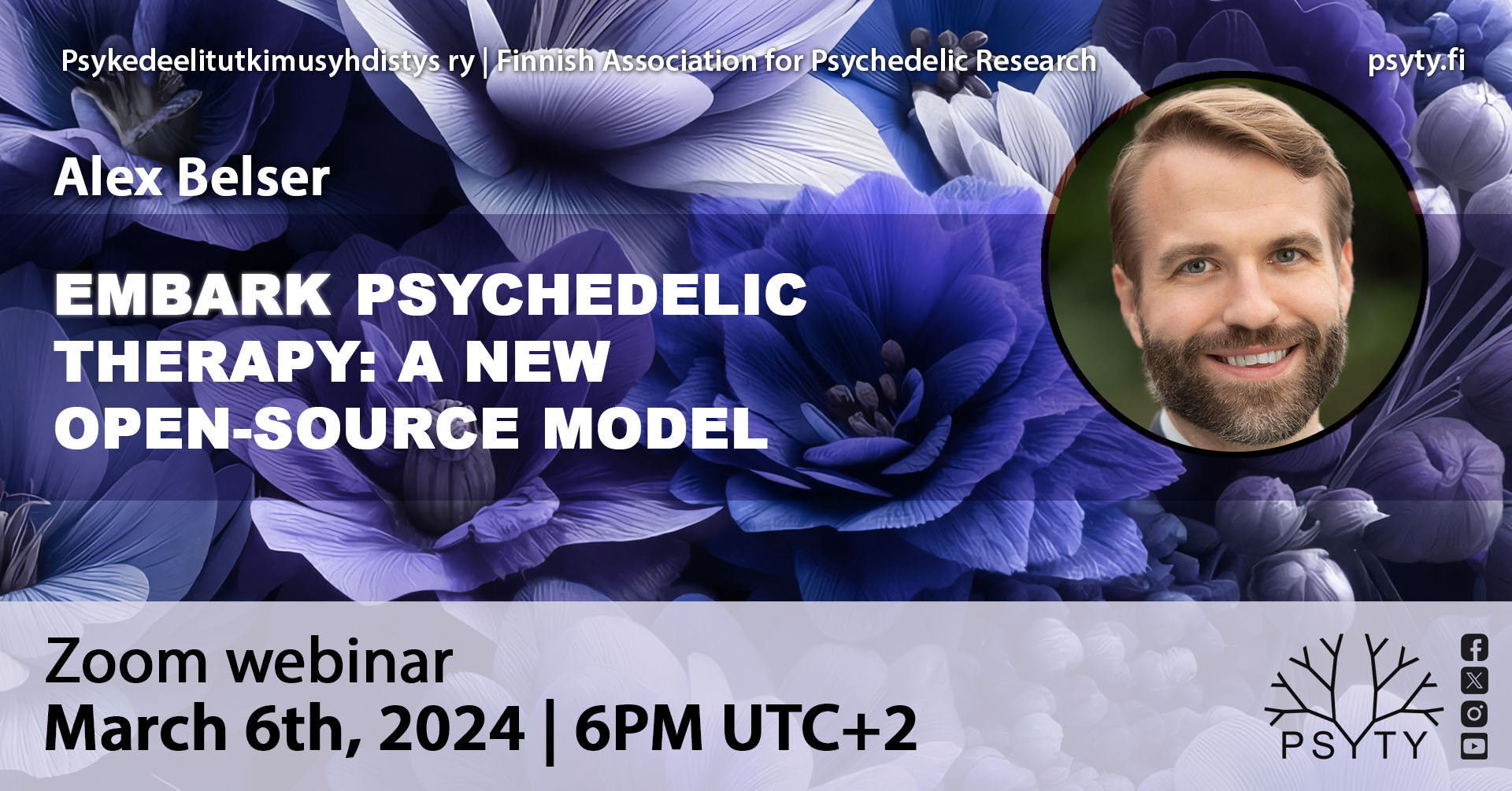
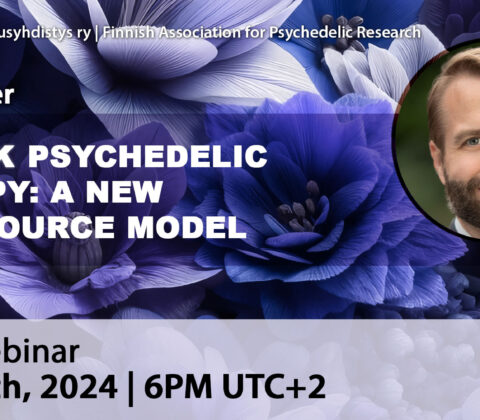
Webinar March 6th, 2024: Alex Belser – EMBARK Psychedelic Therapy: a New Open-Source Model
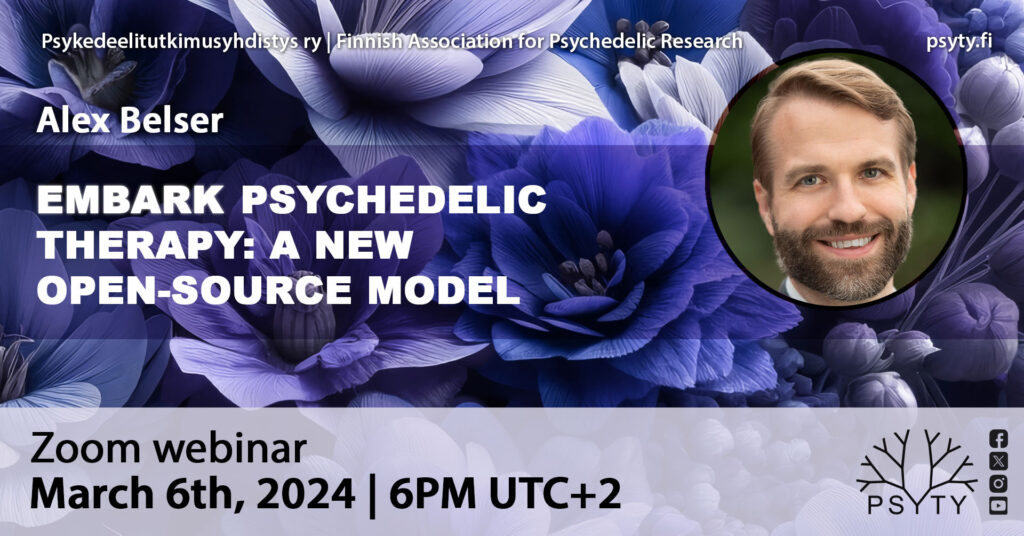
The conventional history of psychedelic-assisted therapy (PAT) research has been criticized for things such as missing critical histories of harm and the stories of marginalized groups, and a lack of focus on key therapeutic elements such as therapist–participant relationship, attentiveness to the body, counseling for spiritual experiences, and ethical considerations. On Wednesday March 6th 2024 at 6PM (UTC+2), psychologist and clinical scientist Alex Belser will introduce the EMBARK model that represents a novel model in psychedelic therapy, designed to address the limitations of previous models by offering a comprehensive, ethical, and inclusive framework.
In addition to the missing elements mentioned above, previous PAT models have suffered from underdeveloped therapeutic frames and a reliance on pre-existent evidence-based (non-psychedelic) approaches. The EMBARK model addresses these shortcomings by offering a transdiagnostic and trans-drug approach adaptable to various indications and psychedelic medicines. It is built upon four Cornerstones of Care: Trauma-Informed Care, Culturally Competent Care, Ethically Rigorous Care, and Collective Care, reflecting a foundational belief that efficacious treatment is ethical treatment.
The EMBARK acronym points to six Clinical Domains that commonly emerge in psychedelic experiences: Existential-Spiritual, Mindfulness, Body Aware, Affective-Cognitive, Relational, and Keeping Momentum. For the treatment of depression, twelve mechanisms of therapeutic change are outlined.
The EMBARK approach has a growing evidence-base: in a recent psychedelic clinical trial, 79% of participants achieved full remission from depression three weeks after treatment. EMBARK psychedelic therapy is intended to be open-sourced to the clinical community for development and adaptation to other psychedelic medicines (e.g., DMT, LSD, MDMA, ketamine) other contexts (e.g. group therapy, conjoint/couples therapy), diverse populations (e.g., LGBTQIA+ participants) and to inform the development of psychedelic practitioner training.
The event contains a Q&A section. The total length is 2 hours. Tickets are available from our web store. The event is free for charge for members who’ve paid their membership fee for 2024. If you want to pay your membership fee for this year or become a member, you’ll find our membership products on the main page of our web store. Members who have paid the membership fee will be sent a free registration link via email.
Alex Belser, PhD is a psychologist and clinical scientist exploring psychedelic therapies to alleviate human suffering. At Yale University, he’s a Co-Investigator for a study of psilocybin treatment for OCD. His book, EMBARK Psychedelic Therapy for Depression: A New Approach for the Whole Person (Oxford University Press), co-authored with Dr. Bill Brennan, offers a clinical guide to working with psychedelic medicines. He enjoys training clinicians and has taught in ten psychedelic training programs about psilocybin, MDMA, ketamine, and DMT therapies. Dr. Belser co-founded a number of early psychedelic organizations including the university team at NYU in 2006 and Nautilus Sanctuary, a non-profit psychedelic center. He served as the Chief Clinical Officer of Adelia Therapeutics and Cybin, leading clinical teams in the US and Europe. His last book is Queering Psychedelics: From Oppression to Liberation in Psychedelic Medicine. His work has been featured in the media, with coverage in the New York Times, the Atlantic, The Guardian, Forbes, Rolling Stone, NPR, and in Michael Pollan’s book, How to Change Your Mind. Dr. Belser is a teacher of hatha and kundalini yoga. He studied at Georgetown, Cambridge, Columbia, NYU, and Yale. More information is available at http://alexbelser.com and https://www.centerforbreakthroughs.com
Study on the prevalence of psychedelic experiences among psychedelic researchers
Do you conduct academic research related to psychedelics? Please take part in our survey regarding the prevalence of psychedelic experiences among psychedelic researchers. We hope for answers from all psychedelic researchers, regardless of whether they have had their own psychedelic experiences or not. You can answer until May 8th. Also feel free to spread information about the study to your colleagues and networks!
The research is carried out by Dr. Aila Mustamo (University of Turku) and Dr. Jussi Jylkkä (Åbo Akademi University).
You can participate in the survey via this link.
For more information, please contact the researchers: Aila Mustamo (aila.mustamo (at) utu.fi), Jussi Jylkkä (jussi.jylkka (at) abo.fi).
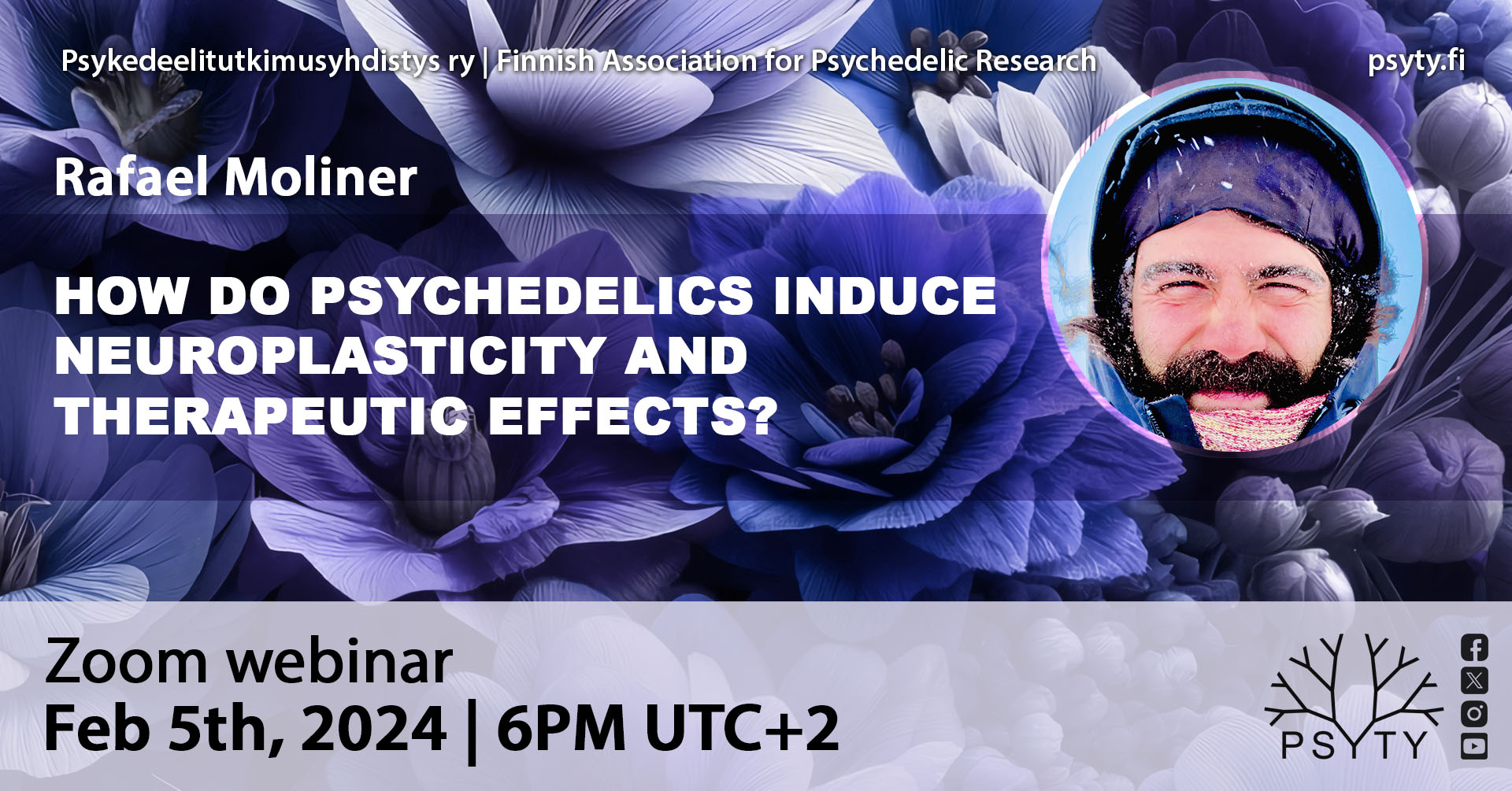
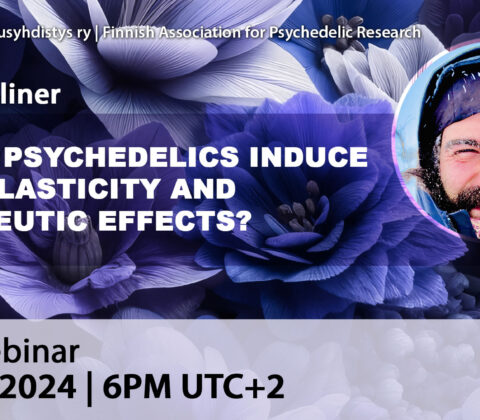
Webinar February 5th 2024: Rafael Moliner – How do psychedelics induce neuroplasticity and therapeutic effects?
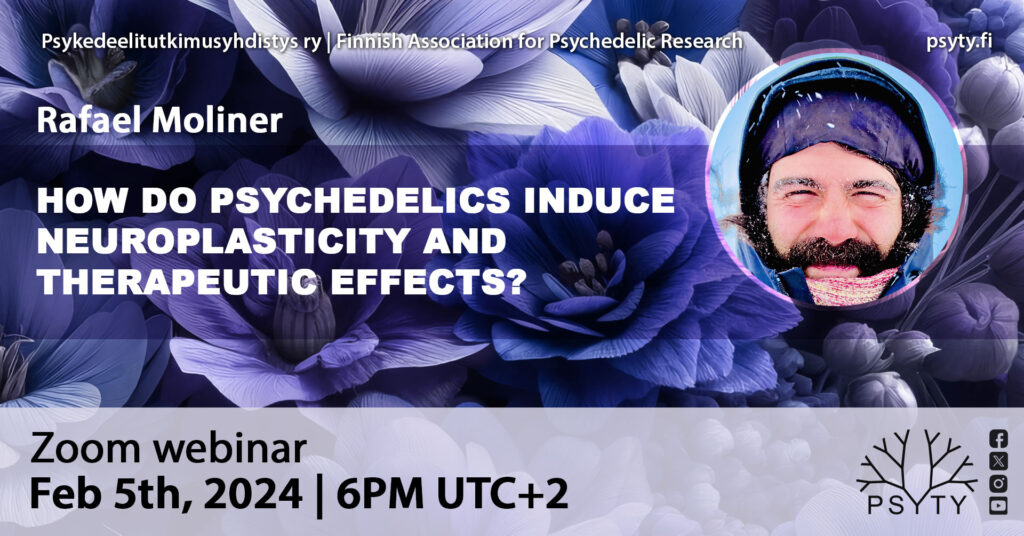
Recent studies have shed light on the potential use of psychedelics such as LSD and psilocybin for depression. While known for their quick and lasting antidepressant effects, the hallucinogenic properties of these substances, with the risks inherent to them, may limit their widespread clinical adoption. Recent research indicates that some of their therapeutic benefits might be harnessed without the hallucinogenic effects. This is one of the themes that biochemist and neuroscientist Rafael Moliner will cover in a webinar organized by the Finnish Association for Psychedelic Research on Monday February 5th 2024, 6PM (UTC+2).
Essentially all antidepressants, including fluoxetine and ketamine, act by binding to TrkB, the receptor for the brain-derived neurotrophic factor (BDNF). Moliner’s recent research, conducted at the University of Helsinki and published last year, discovered that LSD and psilocin directly bind to TrkB with affinities 1,000-fold higher than those for other antidepressants. The research provides additional support to the view of TrkB’s central role in antidepressant effects, suggesting new drugs that don’t activate the 5-HT2A receptor (which is relevant to psychedelic effects) as a promising new avenue of research.
There are several reasons to explore such drugs. Psychedelics can occasionally produce hallucinogen persisting perception disorder (HPPD) or irreversible psychotic episodes in susceptible populations, which has led to routinely excluding patients with a family history of bipolar disorder or schizophrenia from participating in psychedelic clinical trials. While there is intense ongoing debate on how much of the therapeutic potential of psychedelics is a direct result of the things experienced during the treatment sessions, it’s also obvious that there is need for new treatments for situations where such intense experiences are not welcome or even viable.
The event length is around 45 minutes for the lecture and 30 minutes for audience questions. The event is free of charge for everyone interested – you’ll receive a free participation link by registering here.
About the speaker: Rafael studied biochemistry at the Autonomous University of Barcelona (Spain) and neuroscience at the University of Helsinki (Finland). He developed his doctoral research at the laboratory of Eero Castrén, where he contributed to the groundbreaking discovery that antidepressants produce their therapeutic effects through direct binding and allosteric modulation of the BDNF receptor TrkB. More recently, Rafael had a leading role in the multidisciplinary research effort that unveiled how psychedelics with therapeutic potential bind to TrkB with much higher affinities than antidepressants, which could help explain their faster and more long-lasting effects on plasticity and antidepressant action. Importantly, his research also revealed that the therapeutic-like effects of psychedelics through TrkB are independent of their hallucinogenic action, which opens an avenue for the development of safer therapeutics with the fast and persistent antidepressant effects of psychedelics but devoid of hallucinations.
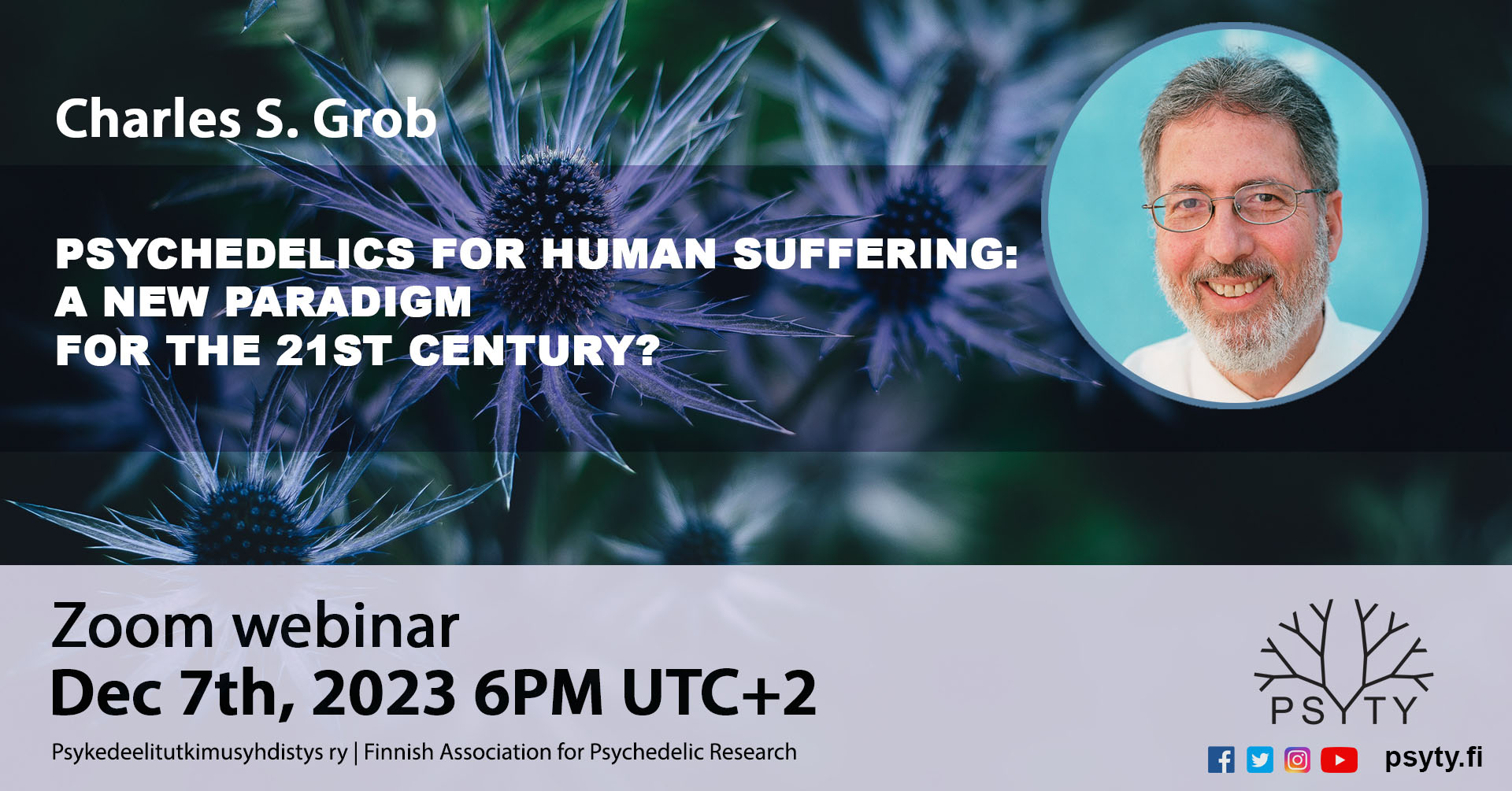
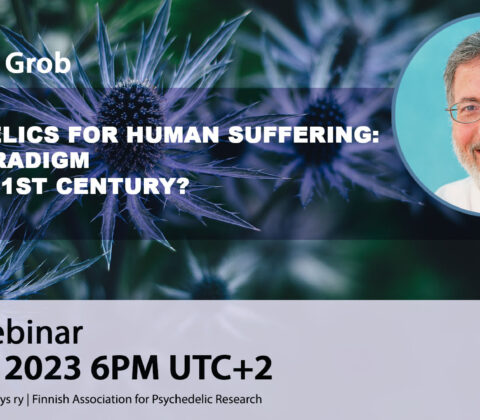
Webinar December 7th 2023 | Charles S. Grob – Psychedelics for Human Suffering: A New Paradigm for the 21st Century?
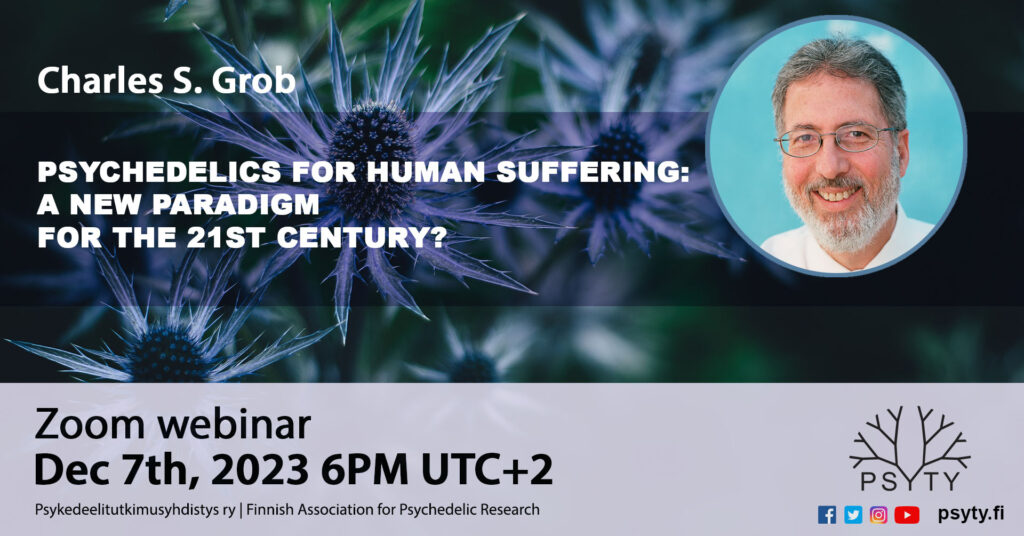
Clinical research on psychedelics has come a long way from its origins in the middle of the 20th century. One of the key figures in the current revival of psychedelic research is psychiatrist Charles S. Grob who has, since the 1990s, conducted important research on ayahuasca and psilocybin, amongst others. On Thursday December 7th, 6PM (UTC+2), dr. Grob will talk about the history of psychedelic research and the present and future implications of his own research projects – both for future projects and the practice of psychiatry and medicine.
The talk will review the history, ethnobotany, pharmacology and clinical research record of psychedelic drugs in human subjects. Prior investigations during the 1950s and 1960s will be examined as will the socio-cultural reactions that led to their termination by the early 1970s. An overview of the reemergence of psychedelic research in the modern era will be conducted, with particular emphasis on examining recent research using a psilocybin treatment model in the treatment of human subjects with advanced-stage medical illness approaching the end-of-life who are suffering from severe existential distress and demoralization.
The implications of this body of investigation will be addressed with an emphasis on the necessity to safeguard optimal safety and ethical conduct. Particular attention will be given to the rationale, methodology and development of a new multi-site research project designed to explore the utility of psychedelic treatment at the end-of-life in the palliative care setting.
The event contains a Q&A section. The total length is 2 hours.
Tickets are available from our web store. For members of the association who’ve paid their membership fee for 2023, the event is free of charge. If you want to pay your membership fee for this year or become a member, you’ll find our membership products on the main page of our web store. An email with a link for free registration to the event has been sent to members of the association. If you’re not sure if you’ve paid for your membership this year, feel free to ask us.
Charles S. Grob, M.D. is Professor of Psychiatry and Pediatrics at the UCLA School of Medicine and the Director of the Division of Child and Adolescent Psychiatry at the Harbor-UCLA Medical Center. He previously held faculty positions at the Johns Hopkins School of Medicine and the University of California at Irvine. He has conducted approved clinical research with psychedelics since the early 1990s. From 2004-2008 he was the Principal Investigator of the first study in several decades to examine the use of a psilocybin treatment model for patients with advanced-cancer anxiety. He has also conducted research into the range of effects of MDMA, in both normal volunteers and in a selected subject population of adult autistics with severe social anxiety. And, he has conducted a series of ayahuasca research studies in Brazil.
Over the last thirty years Dr. Grob has published numerous articles and chapters on psychedelics in the medical and psychiatric literatures and he is the editor of Hallucinogens: A Reader (Putnam/Tarcher, 2002), co-editor (with Roger Walsh) of Higher Wisdom: Eminent Elders Explore the Continuing Impact of Psychedelics (SUNY Press, 2005) and co-editor (with James Grigsby) of the recently published Handbook of Medical Hallucinogens (Guilford Press, 2021). He is a founding board member of the Heffter Research Institute.
Matthew W. Johnson: Pitfalls of Psychedelic Medicine and Science – webinar recording now available!
It is not uncommon for high dose psychedelic experiences to involve “big questions,” for example: What is the meaning of life? What is the nature of reality? Does God exist? In this webinar presentation held in September 2023, Dr. Matthew W. Johnson discussed the responsible handling of such experiences in therapeutic contexts.
Psychedelic experiences are believed to increase suggestibility and to occasion highly personal and meaningful experiences for patients. For this reason, a common but dangerous tendency for clinicians and scientists is to assume that psychedelic therapy constitutes an exception to many accepted clinical and ethical norms. Jonhson argues, however, that the intensity and meaningfulness of psychedelic effects call for even greater attention and adherence to the wisdom of clinical boundaries and norms.
Johnson argues that it is critical in clinical practice to let the patient determine her or his own metaphysical meaning, if any, from psychedelic experiences, rather than to impose or introduce the clinician’s own metaphysical beliefs, even ones that may seem innocuous to the clinician or scientist such as the “perennial philosophy.” Clinicians and scientists must avoid falling into the roles of guru or religious leader, and only introduce concepts grounded in their professional, empirically informed expertise.
Finally, regarding the science of psychedelics, much has been stated on the propensity of psychedelics to “expand consciousness”, and scientists have viewed psychedelics as tools to understand the “nature of consciousness.” Johnson calls for scientists to use precision when discussing concepts referred to as “consciousness” such as phenomenal consciousness, access consciousness, and self-concept, and be cautious to not overstate what is scientifically known regarding the relation between psychedelics and these concepts. He argues that scientists should do a better job with phenomenology regarding psychedelics and these concepts, meaning that we need to be judicious in distinguishing insights that people claim to have about, for example, phenomenal consciousness in psychedelic experiences, from what we can objectively claim to have learned about phenomenal consciousness from psychedelic research.
The lecture is now available on our Youtube channel!
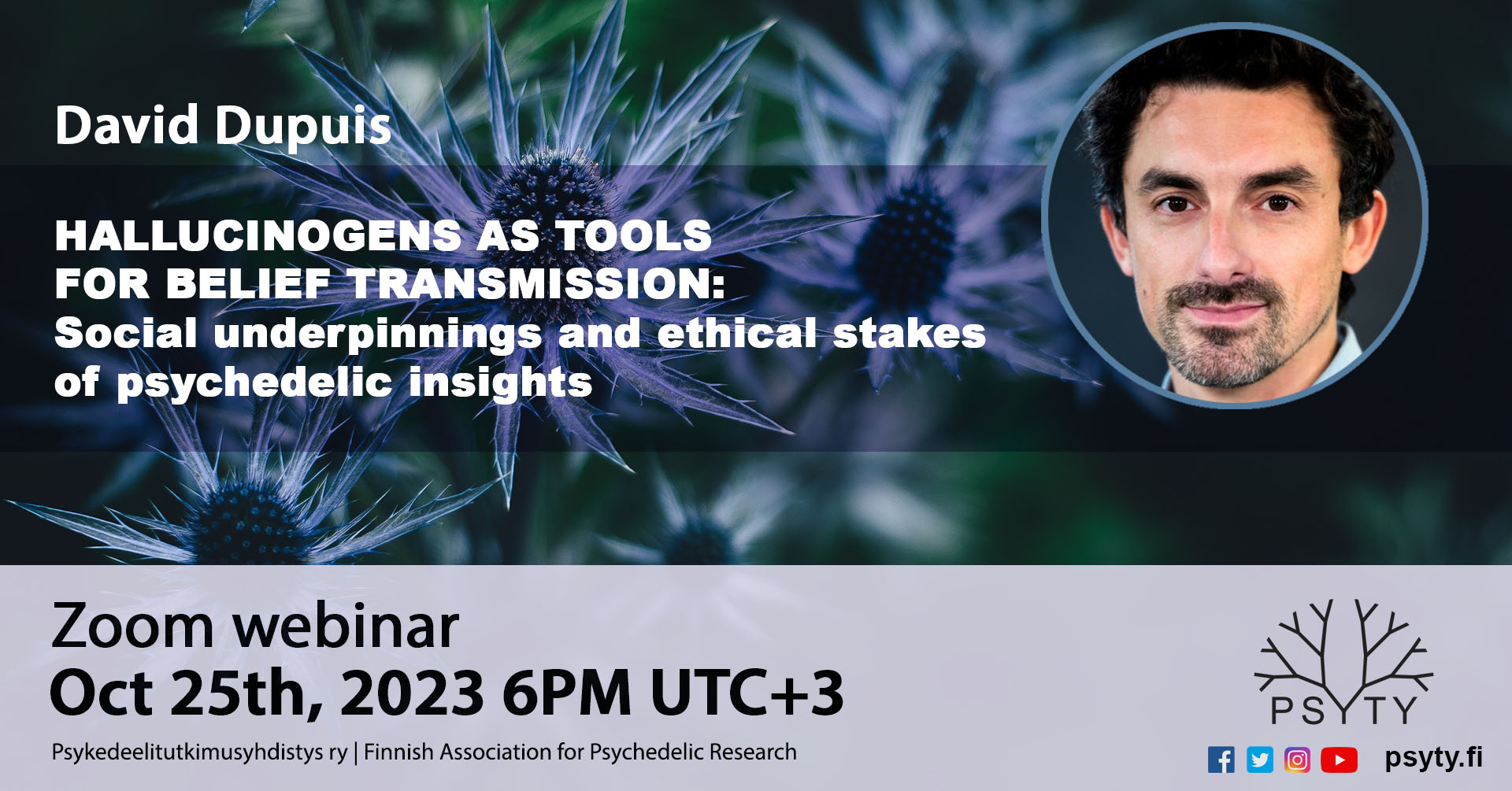
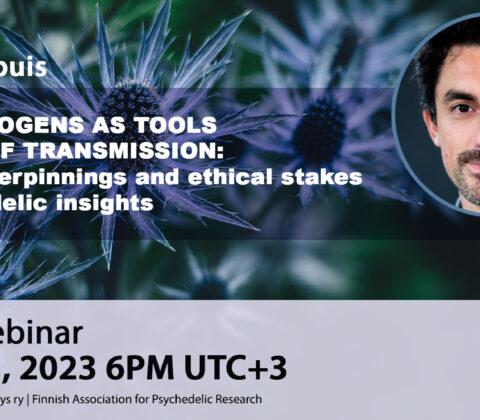
Webinar October 25th 2023 | David Dupuis – Hallucinogens as tools for belief transmission. Social underpinnings and ethical stakes of psychedelic insights
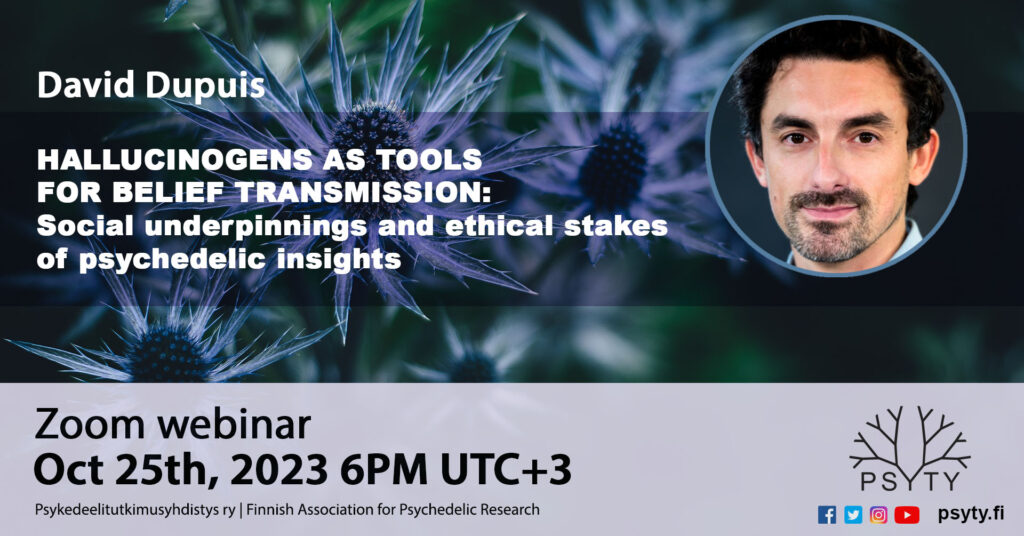
The use of psychedelics in the collective rituals of numerous indigenous groups suggests that these substances are powerful catalysts of social affiliation, enculturation and belief transmission. This feature has recently been highlighted as part of the renewed interest in psychedelics in Euro-American societies, and seen as a previously underestimated vector of their therapeutic properties. However, it also raises complex ethical questions in the context of the globalization of these substances. In the past decades, this property has been perceived as problematic by anticult movements and public authorities of some European countries, claiming that these substances could be used for “mental manipulation.”
On Wednesday October 25th, 6PM (UTC+3), social anthropologist David Dupuis, a Research Fellow at the French Institute of Health and Medical Research, will tackle this challenging topic in a webinar organized by the Finnish Association for Psychedelic Research.
Despite the fact that the notion of psychedelic as tools for mental manipulation has been criticized by the scientific community, alternative perspectives on how psychedelic experience supports enculturation and social affiliation have been yet little explored. Beyond the political issues that underlie it, the re-emergence of the concept of “psychedelic brainwashing” can then be read as the consequence of the fact that the dynamic through which psychedelic experience supports persuasion is still poorly understood. Beyond the unscientific and politically controversial notion of brainwashing, how to think about the role of psychedelics in the dynamics of transmission of belief and its stakes?
Drawing on ethnographic data collected in a shamanic center in the Peruvian Amazon, dr. Dupuis addresses this question through an ethnographic case-study. Proposing the state of hypersuggestibility induced by psychedelics as the main factor making the substances powerful tools for belief transmission, he will explore the ethical stakes of these observations on the current context of medicalization of psychedelics.
The event contains a Q&A section. The total length is 2 hours. Tickets are available in our web store. For members of the association who’ve paid their membership fee for 2023, the event is free of charge. If you want to pay your membership fee for this year or become a member, you’ll find our membership products on the main page of our web store. An email with a link for free registration to the event has been sent to members of the association. If you’re not sure if you’ve paid for your membership this year, feel free to ask us.
David Dupuis, Ph.D. (INSERM Research Fellow, IRIS/EHESS), is a Research Fellow at the French Institute of Health and Medical Research (INSERM) conducting research at the intersection of Psychedelic Studies, Anthropology of Mental Health & Cultural Psychiatry. His research interests lie mainly within the contemporary reconfigurations of the social status of psychedelic substances and hallucinatory experiences. He explores the cultural, political, clinical and ethical implications of these dynamics within Euro-American societies. His work is based on ethnographic fieldwork conducted since 2008 in Latin America (Peruvian Amazon, Mexico) and Europe (United Kingdom, France).
Ruben Laukkonen: Psychedelics, insight, and the pursuit of truth – A recording of our webinar with Ruben Laukkonen now available
The emergence of insights during psychedelics is remarkably important for therapeutic progress. Insights can be a source of creativity, discovery, and even healing, but they can also mark the beginning of a delusional episode, or potentially entrench and perpetuate false beliefs. From this starting point, neuroscientist Ruben Laukkonen presented a fascinating webinar lecture on August 2023.
In the talk, Dr. Laukkonen reviews evidence from a series of experiments that expose both the light and the dark side of insight. These findings will be integrated within an active inference account, wherein feelings of insight can give rise to, and entrench, new beliefs and perspectives during psychedelic experiences. Put simply, the combination of intense insights and relaxed beliefs creates the profound potential for plasticity and change. However, this plasticity risks the insight-catalysed lodging of false or maladaptive beliefs (possibly triggering mania). These ideas are then grounded by discussing the different kinds of insights that arise and how to nudge them in the “right” direction, and how we might define that direction.
The lecture is now available on our Youtube channel!
Psychedelic Psychiatry: What can we learn from the past? A recording of our webinar with Erika Dyck now available
In 1956, psychiatrist Humphry Osmond first used the word ‘psychedelic’ to describe the feelings and sensations associated with LSD. The term, conceived during his correspondence with the literary genius Aldous Huxley, was soon added to the English lexicon. In spite of the popular connotations now connected to the word, Osmond developed the term out of his LSD experiments with colleagues at the University of Saskatchewan. The experiments led him to propose a new theory of schizophrenia alongside a somewhat radical suggestion to treat alcoholism using LSD. In contrast with many of his psychiatric contemporaries, Osmond and his colleagues maintained that pharmacotherapies flourished most when combined with tenets of empathy, deference, and even ritual – features he learned from Indigenous ceremonies with plant medicines.
Although Osmond was not alone among his colleagues in the 1950s fascinated with the medical applications of psychedelics, his work in Canada made him a major figure in the history of LSD and addiction research, but also an awkward character in a looming countercultural revolution. LSD was banned from use by the late 1960s for a combination of moral and scientific reasons, but new developments in the 21st century are encouraging policy makers and researchers to revisit these historical studies.
In a webinar lecture held in June 2023, professor Erika Dyck from the University of Saskatchewan’s Department of History, we dove into the history of psychedelics and considered what we might learn from the past as we entertain a psychedelic renaissance. What do we have yet to learn from Indigenous roots of psychedelic ceremonies, or from missteps of the past that might warrant a retrial? We considered examples from the past and also looked at how historical ideas have continued to influence the psychedelic movement today.
The lecture is now available on our Youtube channel!
